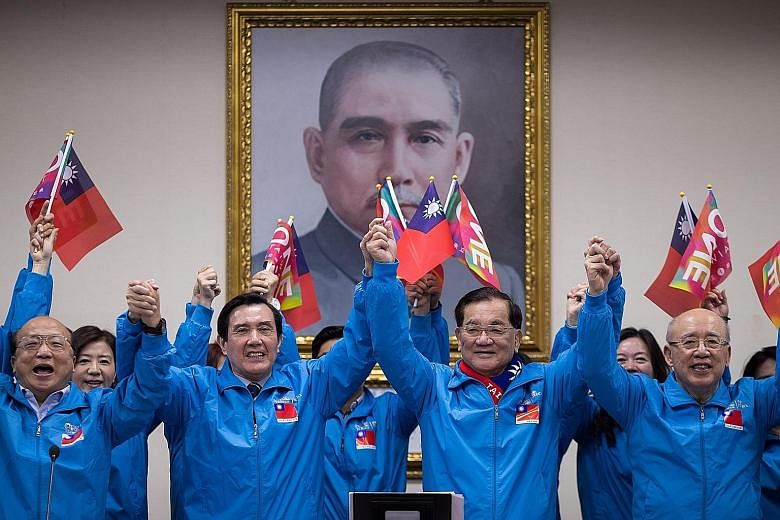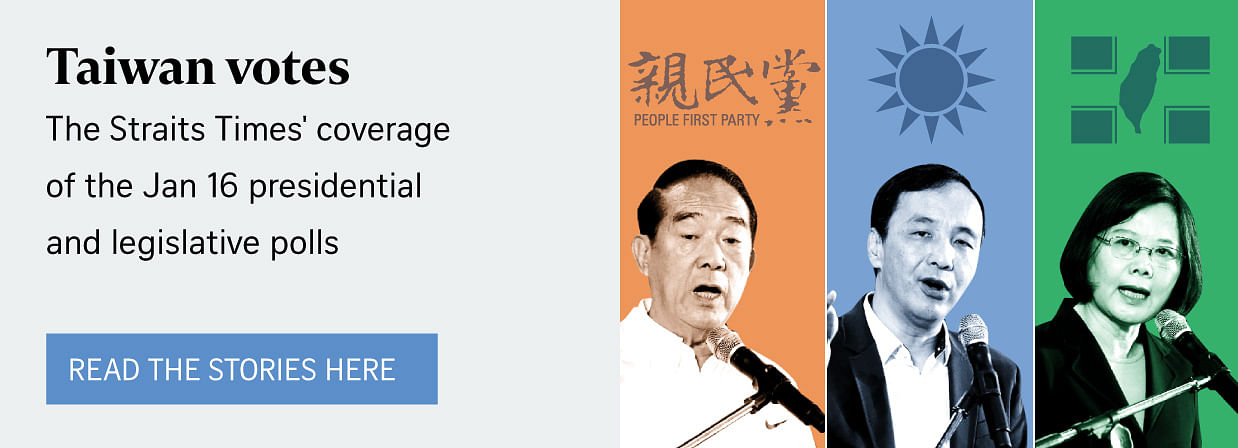Taiwan will likely hang in political limbo for four months, in the great likelihood that Democratic Progressive Party (DPP) chairman Tsai Ing-wen wins the presidential election tomorrow.
This is because she will be sworn in as President only on May 20. Until then, President Ma Ying-jeou from the Kuomintang (KMT) party will continue to govern.
This means that major decisions cannot be made by both the incoming and outgoing administrations, said DPP secretary-general Joseph Wu, who added that it is a problem.
"I don't think Taiwan can wait or sit idle for four months," he said at a press conference for the international media yesterday.
His party is proposing the establishment of a mechanism to allow for intra-party negotiations to "build new politics based on consensus, instead of opposition and conflict". He did not give details.
A new legislature, also to be elected tomorrow and potentially with a DPP majority for the first time in Taiwan's history, will be sworn in on Feb 1.
This will pose another sticky problem given that it has the power to approve the policies and Budget of the premier - who is appointed by the sitting president - and the Cabinet.
The DPP wants to pass a "transitional Bill" to help guide lawmakers to navigate this situation.
But analysts are sceptical these plans can materialise because of the feuding between the two parties.
Professor Edward Chen I-hsin, who teaches American Studies at Taipei's Tamkang University, said he does not foresee the KMT and DPP sitting down to work together.
"They will argue on many issues. Even if President Ma is willing to do so, his bureaucrats will not be willing... If he becomes a lame duck, he will be criticised too."
Prof Chen added that the only way forward is to amend the Constitution to shorten the transition period, though it will take months, if not years, to be approved by Parliament and the Supreme Court.
On the penultimate day of the election campaign yesterday, Mr Ma led a group of KMT heavyweights in calling on voters to support his embattled party. KMT presidential candidate Eric Chu is facing an uphill battle, with all polls indicating that he will lose.
Mr Ma mounted a stout defence of his track record, saying he had guided Taiwan through three economic crises - in 2008, 2011 and 2014.
During his eight years as President, Taiwan's crime rate dropped, the number of tourists increased and the security situation Taiwan faced was the "safest in 60 years".
"We were able to create peace in the Taiwan Strait, the East and South China seas, and earned the world's admiration."
KMT is thus the best bet for stability, he said.
Yesterday, when asked to elaborate on DPP's position on Taiwan's relations with China, Dr Wu repeated Ms Tsai's pledge to maintain the current "status quo" but did not specify her stance on the so-called 1992 Consensus, which recognises one China - albeit with differing interpretations.
Dr Wu said attention should instead focus on the economy, as that is the "most important issue".
Key on the DPP's agenda will be to ready negotiations paving the way for Taiwan to join the Trans-Pacific Partnership. Being part of the free trade pact is aimed at reducing Taiwanese businesses' reliance on the Chinese economy, which is slowing down, said Dr Wu.
He also touched on the medium- to long-term solutions to restructure the sluggish Taiwanese economy, such as investing in renewable energy and boosting the defence industry.
"These might not be quick or fast solutions but they are necessary to bring Taiwan to the next generation," he said.


